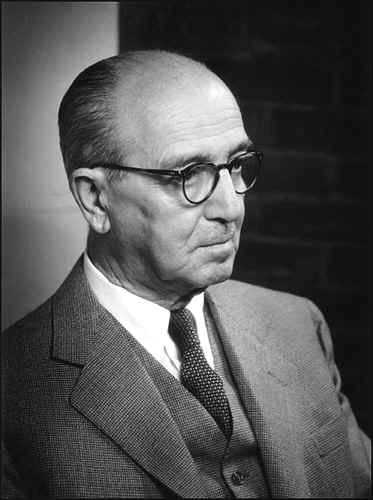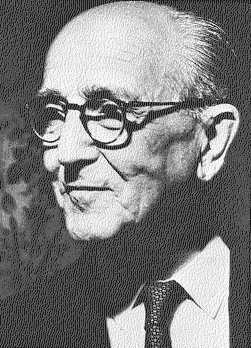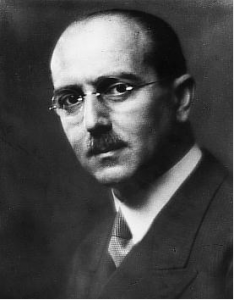<Back to Index>
- Jurist and Legal Philosopher Hans Kelsen, 1881
PAGE SPONSOR



Hans Kelsen (October 11, 1881 – April 19, 1973) was a jurist and legal philosopher. He has been regarded as one of the most important legal scholars of the 20th century.
Kelsen was born in Prague to Jewish parents. He moved to Vienna with his family when he was three years old. Having graduated from the Akademisches Gymnasium, he studied law at the University of Vienna, taking his doctorate in 1906. In 1911, he achieved his habilitation (license to hold university lectures) in public law and legal philosophy and published his first major work, Main Problems in the Theory of Public Law (Hauptprobleme der Staatsrechtslehre).
In 1912, Kelsen married Margarete Bondi, and the couple had two daughters.
In 1919, he became full professor of public and administrative law at the University of Vienna. He established and edited the Journal of Public Law (Zeitschrift für öffentliches Recht) in Vienna. At the behest of Chancellor Karl Renner, Kelsen worked on drafting a new Austrian Constitution, enacted in 1920. The document still forms the basis of Austrian constitutional law. Kelsen was appointed to the Constitutional Court, for a life term. In 1925, he published General Theory of the State (Allgemeine Staatslehre) in Berlin.
Following increasing political controversy about some positions of the Constitutional Court (especially about divorce) and an increasingly conservative climate, Kelsen, who was considered a Social Democrat, although not a party member, was removed from the court in 1930.
Kelsen accepted a professorship at the University of Cologne in 1930. When the Nazis came to power in Germany in 1933, he was removed from his post and moved to Geneva, Switzerland, and taught international law at the Graduate Institute of International Studies from 1934 to 1940.
In 1934, he published the first edition of Pure Theory of Law (Reine Rechtslehre). In Geneva he became more interested in international law. In 1936 – 1938 he was professor at the German University in Prague.
In 1940, he moved to the United States, giving the Oliver Wendell Holmes Lectures at Harvard Law School in 1942 and becoming a full professor at the department of political science at the University of California, Berkeley, in 1945. Pakistan's future President and Prime Minister Zulfiqar Ali Bhutto attended lectures by him at Berkeley. During those years, he increasingly dealt with issues of international law and international institutions such as the United Nations. In 1953 - 54, he was visiting Professor of International Law at the United States Naval War College.
Kelsen's main practical legacy is as the inventor of the modern European model of constitutional review - first introduced in both Austria and Czechoslovakia in 1920, then in the Federal Republic of Germany, Italy, Spain, Portugal, and later many countries of Central and Eastern Europe. The Kelsenian court model sets up a separate constitutional court, which may have sole responsibility over constitutional disputes within the judicial system. This is different from the system usual in common law countries, including the U.S.A., in which courts of general jurisdiction from the trial level up to the court of last resort frequently have powers of constitutional review.
Kelsen is considered one of the preeminent jurists of the 20th century and has been highly influential among scholars of jurisprudence and public law, especially in Europe and Latin America although less so in common law countries.
His Pure Theory of Law aims to describe law as binding norms while at the same time refusing, itself, to evaluate those norms. That is, 'legal science' is to be separated from 'legal politics'. Central to the Pure Theory of Law is the notion of a 'basic norm (Grundnorm)' - a hypothetical norm, presupposed by the jurist, from which in a hierarchy all 'lower' norms in a legal system, beginning with constitutional law, are understood to derive their authority or 'bindingness'. In this way, Kelsen contends, the bindingness of legal norms, their specifically 'legal' character, can be understood without tracing it ultimately to some suprahuman source such as God, personified Nature or a personified State or Nation. The last was of great theoretical and political importance in Germany and Austria of the 1930s, when Kelsen's principal antagonist was Carl Schmitt.
Kelsen's theory both drew from and has been developed by scholars in his homelands, notably the Vienna School in Austria and the Brno School led by František Weyr in Czechoslovakia. In the English speaking world, H.L.A. Hart and Joseph Raz are perhaps the best known authors who were influenced by Kelsen, though both departed from Kelsen's theories in several respects. The principal writer in English on Kelsen is Stanley L. Paulson.
In his last years, in work that would be published posthumously, Kelsen turned to general theory of norms.
For the occasion of Hans Kelsen's 90th birthday, the Austrian federal government decided on 14 September 1971 to establish a foundation bearing the name "Hans Kelsen - Institut". The Institut became operational in 1972. Its task is to document the Pure Theory of Law and its dissemination in Austria and abroad, and to inform about and encourage the continuation and development of the Pure Theory. To this end it produces, through the publishing house Manz, a book series that currently runs to more than 30 volumes. The Institut administers the rights to Kelsen's works and has edited several works from his unpublished papers, including General Theory of Norms (1979, translated 1991) and Secular Religion (2012, written in English). The founding directors of the Institut, Kurt Ringhofer and Robert Walter, held their posts until their deaths respectively in 1993 and 2010. Successors were Clemens Jabloner (since 1993) and Thomas Olechowski (since 2011).
In 2006, the Hans - Kelsen - Forschungsstelle (Hans Kelsen Research Center) was founded under the direction of Matthias Jestaedt at the Friedrich - Alexander University of Erlangen - Nuremberg. After Jestaedt's appointment at the Albert - Ludwigs - University of Freiburg in 2011, the center was transferred there. The Hans - Kelsen - Forschungsstelle publishes, in cooperation with the Hans Kelsen - Institut and through the publishing house Mohr Siebeck, a historical - critical edition of Kelsen's works which is planned to reach more than 30 volumes.